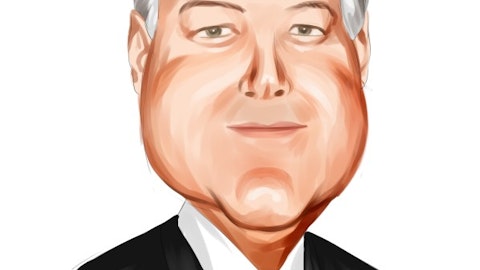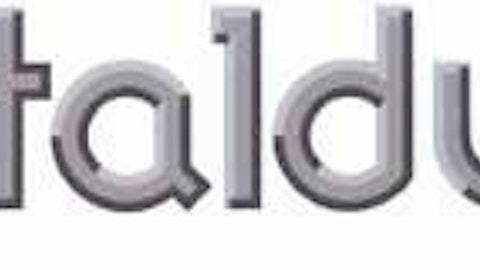The first quarter of 2015 is over and before hedge funds start releasing their Form 13F filings over the next 45 days, we will take a look at the performance of the stocks they have disclosed in their previous filings, which accounted for their holdings as of the end of 2014. The latest results show that equity hedge funds posted an average return of 1.4% last year, preceded by a slightly better 11.1% in 2013. However, in both years, the average return of equity hedge funds underperformed the S&P 500 ETF (SPY) by some 12 and 21 percentage points respectively. This is not a result of hedge fund managers not being good at picking stocks anymore, but rather by their necessity to invest more capital, which makes hedge funds more similar to mutual funds. However, this doesn’t imply that hedge fund managers are not good at picking stocks, it’s just that they can’t completely profit from the pricing inefficiencies among stocks due to the necessity to reduce risk. However, we think that a smaller investor can benefit more by investing in small-cap stocks. Starting with this assumption, we have conducted backtests of equity portfolios of several hundred hedge funds and discovered that the 15 most popular stocks provided returns above the market, by nearly one percentage point per month above the S&P 500 Total Return Index (read more about our backtests). Inspired by the results of these backtests, we have launched a strategy that is based on imitating the 15 most popular small-cap stock picks of more than 700 hedge funds from our database. This strategy generated cumulative returns of 132% over the last 2.5 years, beating the S&P 500 ETF (SPY) by nearly 80 percentage points during that time.
With the first quarter being over, we can see how particular sectors of the economy have performed in terms of their market returns. One of the leaders across sectors was healthcare stocks, which gained around 7% during the first three months, a significant impact being provided by the growth of the biotechnology industry, but also by a series of mergers and acquisitions that consolidated the sector. Among the stocks that hedge funds have been bullish on, many companies are from the healthcare sector, with several stocks (as usual, some of the largest companies in terms of market cap) ranking higher in terms of popularity (the number of funds disclosing long positions in the company). The stocks of the first five from the list of most popular healthcare stocks, which are Actavis plc (NYSE:ACT), Valeant Pharmaceuticals Intl Inc (NYSE:VRX), Gilead Sciences, Inc. (NASDAQ:GILD), Pfizer Inc. (NYSE:PFE), and HCA Holdings Inc (NYSE:HCA), gained ground during the first three months and have an average return of 14.74%. Allergan was also on the list, but we skipped it, since it has been acquired by Actavis and is no longer listed.
Actavis plc (NYSE:ACT) is on the first spot, the company not only being the most popular healthcare pick of hedge funds, but also the third most popular stock overall. Hedge funds have been right about this one, as the stock jumped by 15% during the first quarter. At the end of last year, 131 funds held nearly $14 billion worth of the company’s shares, with the largest stake being disclosed by Andreas Halvorsen’s Viking Global. Viking upped its position in Actavis plc (NYSE:ACT) by 80% during the fourth quarter to 4.59 million shares and the $1.18 billion stake ranks as the fourth-largest in its 13F portfolio.
One of the main reasons that keeps investors interested in holding shares of the company is the constant growth that Actavis plc (NYSE:ACT) has ensured throughout the last several years by acquiring different companies. The acquisition of Ireland-based Actavis by Watson Pharmaceuticals, allowed the company to relocate its headquarters to a more “tax-friendly” country, while other acquisitions have grown the company’s portfolio of generic and branded drugs. The latest acquisition by Actavis plc (NYSE:ACT) was Allergan, whose name the company is planning to take, pending shareholder approval.
Valeant Pharmaceuticals Intl Inc (NYSE:VRX) generated the highest returns among all five healthcare stocks that we are covering in this piece, jumping by nearly 39% during the January-March period. One of the reasons for this growth is the recent acquisition of Salix Pharmaceuticals, Ltd. (NASDAQ:SLXP). Recently, notorious activist investor Bill Ackman’s Pershing Square has disclosed a 5.7% position in Valeant Pharmaceuticals Intl Inc (NYSE:VRX) that contains 19.47 million shares. This makes Pershing Square the largest shareholder of the company among the funds that we track, followed by Jeff Ubben’s ValueAct Capital with 19.38 million shares as of the end of 2014 (Mr. Ubben is also a director on Valeant Pharmaceuticals Intl Inc (NYSE:VRX)’s board). Overall, with Pershing Square, 103 funds,among those that we track now hold long positions in the $67 billion pharmaceutical company.
Investors were also been bullish on the biotech industry during the fourth quarter and Gilead Sciences, Inc. (NASDAQ:GILD) was the most popular stock with 97 investors reporting ownership of $5.0 billion worth of stock. This is not surprising, since the biotechnology industry is flourishing and in fact three of the top gainers on the market are biotech stocks. However, Gilead gained only 4.1% during the first quarter. Nevertheless, during March several analysts upgraded their outlook on Gilead Sciences, Inc. (NASDAQ:GILD)’s stock, including Vetr Inc. and Wells Fargo, with the former upgrading the rating to ‘Strong Buy’ from ‘Buy’ with a price target of $110.67 and the latter reiterating a ‘Buy’ rating and setting a price target of $125.00. Among the funds that we track, the largest shareholder of Gilead Sciences, Inc. (NASDAQ:GILD) is Cliff Asness’ AQR Capital Management, which owns 4.83 million shares as of the end of last year.
Pfizer Inc. (NYSE:PFE) also made the list of the five most popular healthcare stocks among hedge funds with 86 investors reporting holding shares of the company in their latest 13F filings. The stock also had a strong performance during the first quarter, appreciating by 12.66%, which makes it one of the top gainers among stocks with a market capitalization of over $100 billion. Pfizer Inc. (NYSE:PFE) is struggling due to the increased presence of generic drugs producers, which have affected its sales over the past few years, although there are some positive things that investors should be looking forward to. The company is very likely to split in the near future, the first sign being the $17 billion deal to buy Hospira, Inc. (NYSE:HSP), a company engaged in the development of intravenous drugs and devices for injecting them. One of the long-term shareholders of Pfizer Inc. (NYSE:PFE) is Ken Fisher’s Fisher Asset Management, which owns close to 31.20 million shares according to its latest 13F filing.
On the last spot of our compilation is HCA Holdings Inc (NYSE:HCA), which differs from the other four companies by the fact that it is not engaged in the development of drugs but is an operator of medical care facilities. The stock of HCA Holdings increased modestly by 2.5% during the first quarter, slightly underperforming the Medical Care industry, which edged up by 4.80% throughout the same period. One of the reasons for the stock’s growth is the company’s strong financial results for the last year, which showed revenue of $36.92 billion, up from $34.18 billion a year earlier and diluted EPS of $4.16 versus $3.37 in 2013. One of the largest shareholders of HCA Holdings Inc (NYSE:HCA) is Larry Robbins’ Glenview Capital, which owns 6.18 million shares. HCA Holdings was also one of the stocks Mr. Robbins said he liked at last year’s “Delivering Alpha” conference. Overall, a total of 80 funds disclosed holding in aggregate $5.04 billion worth of HCA Holdings Inc (NYSE:HCA)’s stock in their latest 13F filings.
Disclosure: None





